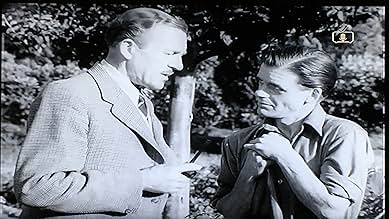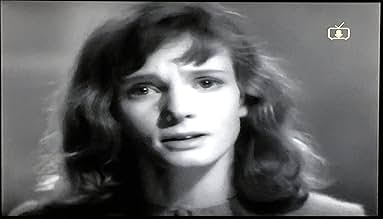Agrega una trama en tu idiomaSmilie that is. A tramp cures a teenager's amnesia and she fails to recognise him afterwards.Smilie that is. A tramp cures a teenager's amnesia and she fails to recognise him afterwards.Smilie that is. A tramp cures a teenager's amnesia and she fails to recognise him afterwards.
- Dirección
- Guionistas
- Elenco
- Dirección
- Guionistas
- Todo el elenco y el equipo
- Producción, taquilla y más en IMDbPro
Opiniones destacadas
This movie certainly has potential going for it - Bill Owen for a start. But it is dreadfully let down by pretty indifferent acting and a muddled script which can't make up its mind what it is. Is this serious or comic? It deals with a serious theme - mental illness. Then throws in some comic bits that are beyond the point presumably because Owen is in it. Then the acting is so wooden. I mean we know Henson is frigid, but after being put over Owen's knee and soundly spanked, would she act as if nothing has happened? The movie adds unlikely scene to unlikely scene till a not very convincing ending.
Elizabeth Henson has never laughed since her father died. Her mother, Betty Stockfield, and the rest of the veddy upper-class household are concerned. Then one day she spots tramp Bill Owen in the garden and laughs, so Miss Stockfield persuades the touchy Owen to help his daughter. He does so by teaching her generosity, which impresses everyone save Miss Henson's grandmother.
It's based on a stage play by Leo Marks, and is typical of a string of British movies of the era which emphasized low-key, amiable compassion -- my favorite of the type is LAST HOLIDAY, with a fine script by J. B. Priestley and J. Lee Thompson, humorous direction in a minor key by Henry Cass, and a typically spot-on performance by Alec Guinness. This movie, in contrast, seems a bit of a muddled translation, showing its stage origins in its stereotyped characters -- although Owen is fine. Some fine black-and-white photography by Geoffrey Faithfull.
It's based on a stage play by Leo Marks, and is typical of a string of British movies of the era which emphasized low-key, amiable compassion -- my favorite of the type is LAST HOLIDAY, with a fine script by J. B. Priestley and J. Lee Thompson, humorous direction in a minor key by Henry Cass, and a typically spot-on performance by Alec Guinness. This movie, in contrast, seems a bit of a muddled translation, showing its stage origins in its stereotyped characters -- although Owen is fine. Some fine black-and-white photography by Geoffrey Faithfull.
The movie is about the masculine and feminine forms that most are not always aware of. It could explain the reasons for its lower IMDB score than usual.
Without appearing sexual, it tries to go into the minds of the individual and how the man attempts to bring out the real personality and character locked within this vulnerable girl.
Most will gloss over it as nothing more than frivolous fun and talk but it deeply underscores the human form from the point of view of both sexes. One can learn a lot about improving ones relationship with each other from this movie alone.
A movie that will continue to strike a chord with many people for years to come, particularly if they take the time to understand the interaction of men and women.
Without appearing sexual, it tries to go into the minds of the individual and how the man attempts to bring out the real personality and character locked within this vulnerable girl.
Most will gloss over it as nothing more than frivolous fun and talk but it deeply underscores the human form from the point of view of both sexes. One can learn a lot about improving ones relationship with each other from this movie alone.
A movie that will continue to strike a chord with many people for years to come, particularly if they take the time to understand the interaction of men and women.
Cheekily-titled programmer is a fitting swansong for director Norman Lee, responsible for "Strip! Strip! Hooray!!!"(1932), a very early British "nudie." The audience was no doubt expecting something sexier than what they got: the young woman in question (Elizabeth Henson) can't quite smile. She appears to have some form of autism or schizophrenia and shocks her family by falling in love with a tramp (Bill Owen). In time-honoured tradition the odd couple change each other's lives. The action is stagily confined to a country house and perhaps appropriately the performances (with the exception of Owen) are strictly provincial rep. But seekers of the unorthodox should note that the film is based on a play by Leo Marks, who went on to shock the world with "Peeping Tom", a far more sensational exploitation of psychosis. "Malcolmgsw" is wrong to state that Marks went on to make glamour and nudist films. He's thinking of Harrison Marks. Leo Marks had nothing to do with the screenplay of this film, whose low comedy is quite inappropriate for the theme. At one point rough Owen puts posh Henson over his knee for a spanking and there is a close shot of her bare legs kicking. But otherwise this is about as far as it's possible to get from Lady Chatterley and her gamekeeper.
The vast amount of ink spilled on the subject of Michael Powell's 'Peeping Tom' (1960) is inclined to overlook this garrulous little curiosity (Norman Lee's directorial swan song), based on a 1947 West End hit by 'Peeping Tom's author Leo Marks. While Powell's film was ahead of its time in anticipating the way the camera shaped life, the hapless family in this film have spawned a young Goth decades too early ("We've taken her to the highest doctors and the lowest comedians, and still she can't laugh!"), with a backstory of child abuse by a responsible adult which anticipates both 'Peeping Tom' and Sam Fuller's 'The Naked Kiss'.
It would be interesting to see what a modern student of psychiatry would diagnose young Ruth's problem as...
It would be interesting to see what a modern student of psychiatry would diagnose young Ruth's problem as...
Selecciones populares
Inicia sesión para calificar y agrega a la lista de videos para obtener recomendaciones personalizadas
- How long is The Girl Who Couldn't Quite?Con tecnología de Alexa
Detalles
Taquilla
- Presupuesto
- GBP 50,000 (estimado)
- Tiempo de ejecución1 hora 25 minutos
- Color
- Relación de aspecto
- 1.37 : 1
Contribuir a esta página
Sugiere una edición o agrega el contenido que falta

Principales brechas de datos
By what name was The Girl Who Couldn't Quite (1950) officially released in Canada in English?
Responda






















